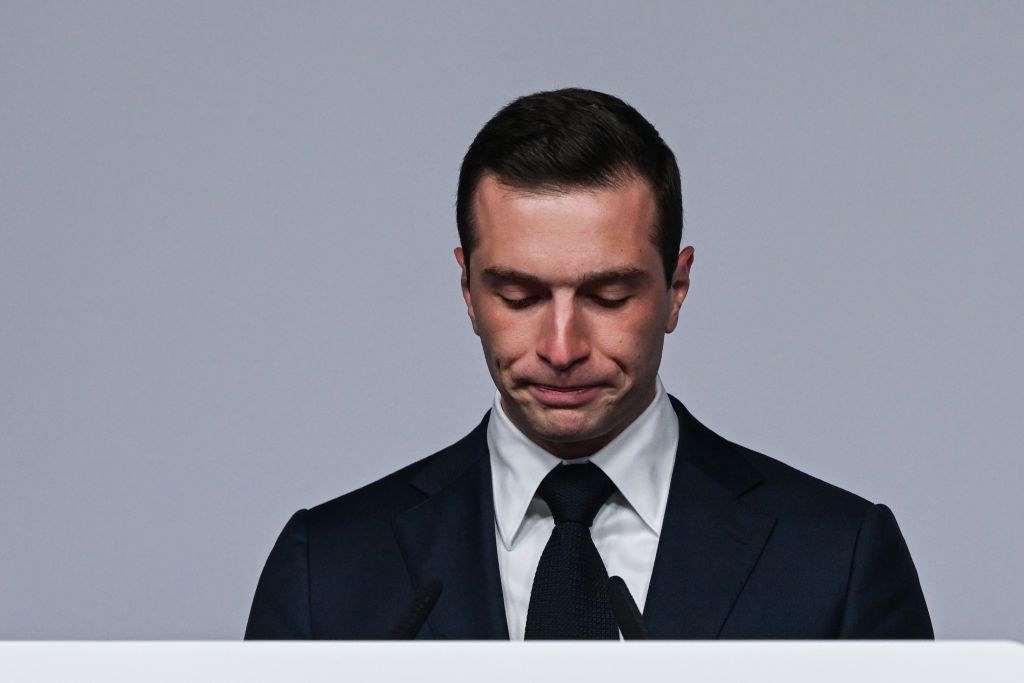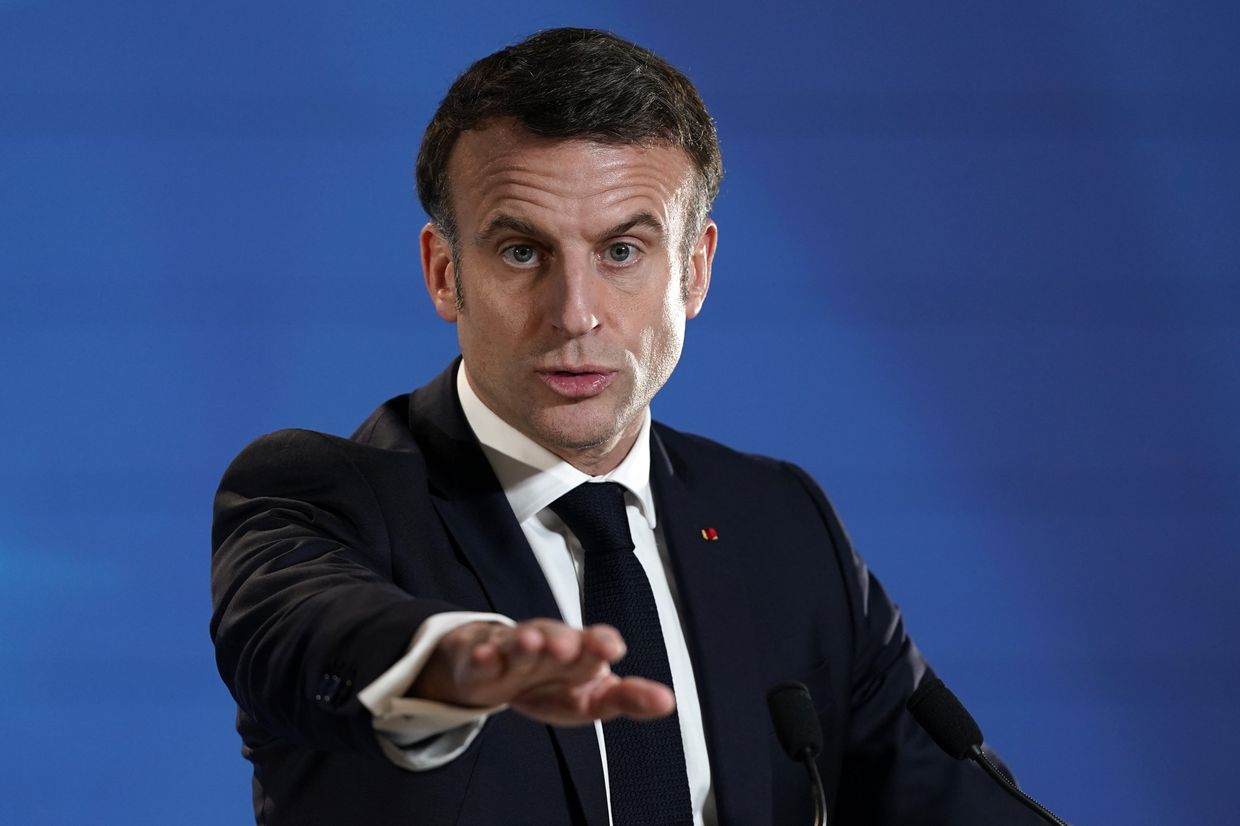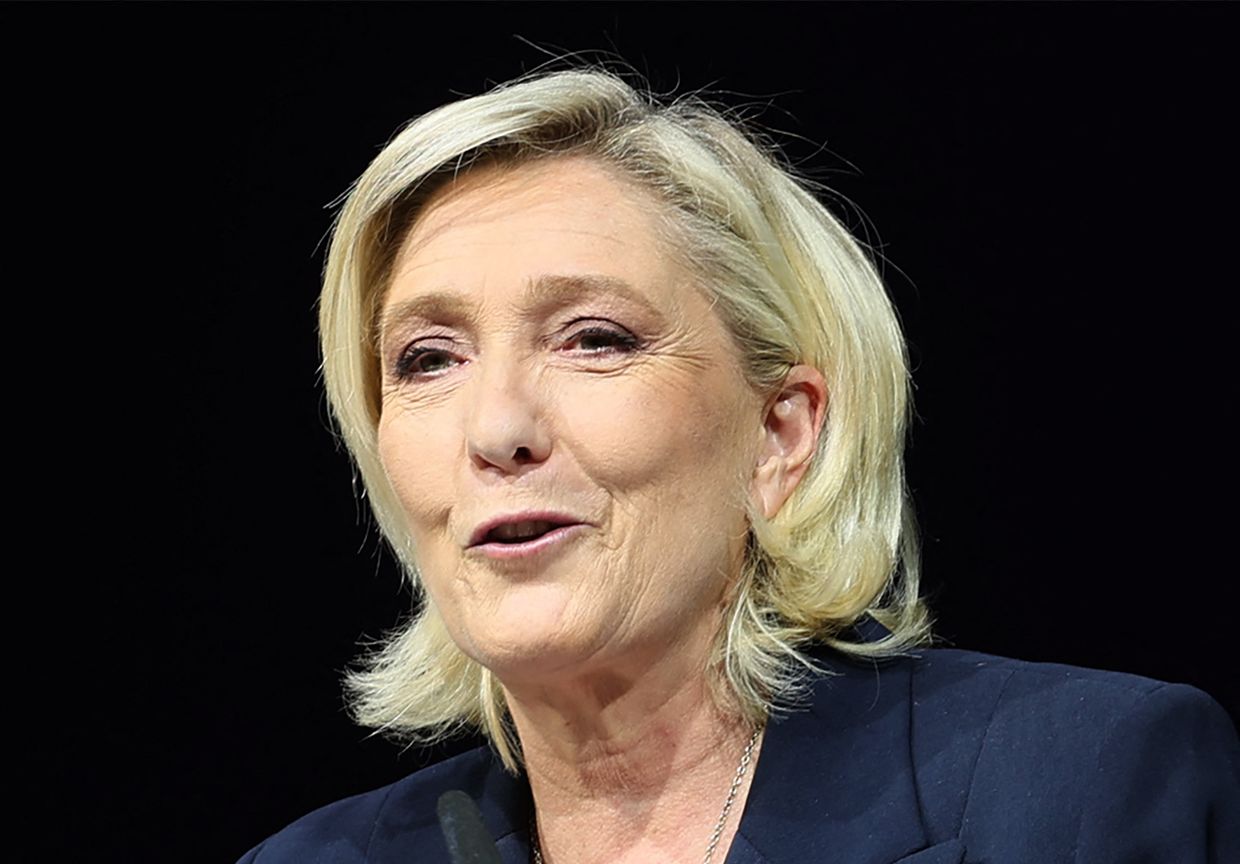French support for Ukraine in the clear, despite political deadlock at home

French President Emmanuel Macron (C) and outgoing Prime Minister Gabriel Attal (2-L) attend a commemoration of the 80th anniversary of the police Prefecture (headquarters) liberation in Paris on Aug. 12, 2024. (Alain Jocard/POOL/AFP via Getty Images)
Over a month after the French elections, the new government coalition is yet to crystallize. And the three warring political blocks that hold the majority of seats in the National Assembly have not come close to forming a workable coalition, a process French politicians are not accustomed to.
French President Emmanuel Macron, who has positioned France as a vocal advocate for Ukraine's struggle against Russian aggression, charged Prime Minister Gabriel Attal to lead a caretaker government during the Paris Olympic Games.
With the games over, the left-wing New Popular Front (NPF) and Macron’s centrist Ensemble coalition are back to the drawing board, attempting to form a government doomed to being unstable.
Yet, whatever the result of the negotiations may be, Ukraine can celebrate that its supporters – represented across various parties – will constitute a majority in the new French parliament, signaling that Paris's Kyiv-friendly foreign policy direction will stay its course.
The far-right National Rally (RN), traditionally friendly to Russia, ended up third with little prospect of forming an alliance. And while ostensibly Ukraine-skeptic voices exist within the left-wing NPF coalition, experts agree they are not strong enough to shift France's foreign policy.
The French Left and Ukraine
When the left-wing New Popular Front (NFP) won the most votes in the second round of the elections on July 7, with Macron's centrist Ensemble coalition following behind, many in Ukraine sighed with relief.
The far-right National Rally (RN), whose parliamentary leader Marine Le Pen has a long history of cozying up to Russian President Vladimir Putin and who promised restrictions on support for Ukraine, was dealt a surprising blow. The RN ended up third with 24.6% and 142 seats.
NFP, which won 32.6% of the votes and 188 seats in the 577-seat assembly, was a hastily gathered alliance of left-to-far-left.
On one hand, there are "moderates" like the Socialist Party (PS) or the Greens (EELV) who have decisively avowed their support for Ukraine.
On the other, more radical groups like the Communists or the France Unbowed (LFI) have instead called for a "diplomatic solution" while warning against "escalation" of the war.
Sebastien Maillard, an associate fellow at Chatham House and special advisor to the Jacques Delors Institute, points to deep-seated differences among individual parties on foreign policy issues.
"The NFP is very divided on Ukraine and on European integration. (Jean-Luc) Melenchon's France Unbowed (LFI) are Euroskeptics, against any enlargement to Ukraine, and (are) Russia-friendly, while the rest of the alliance, especially (Raphaël) Glucksmann’s social democrats, are pro-EU and staunch Ukraine supporters," Maillard told the Kyiv Independent on July 8.
Communist and LFI lawmakers voted against the Ukrainian-French bilateral security agreement in March. Notably, even Le Pen's RN "merely" abstained from that vote.
LFI's founder and long-time leader, leftist firebrand Jean-Luc Melenchon, is well known for enmity toward the U.S. and NATO. The unsuccessful presidential candidate has previously called for France's withdrawal from the alliance.
Melenchon's past statements on Ukraine, most likely inspired by his distaste for the U.S., are also worth reminding.
In 2014, the French far-left leader said that because of Russia's occupation and illegal annexation of Crimea, the peninsula is "lost to NATO," calling it "good news."
While maintaining his criticism of the Western foreign policy, Melenchon toned down his Russia apologia after the outbreak of the full-scale war. Nevertheless, even in March 2024, he warned against the supposed risks of Ukraine entering NATO and drew comparisons between Russian mining of Ukraine and Kyiv using U.S.-supplied cluster munitions.
Manon Aubry, who represents LFI in the European Parliament, said earlier in July that while it is important to support Kyiv, "we also have the responsibility of finding the way out of the war for Ukraine, and this is not going to be with military escalation."
"For Putin not to win… we need to all sit around the table" and return to diplomacy, she added.
Melenchon’s France Unbowed remains the strongest party within NFP with 78 seats but does not hold a majority. The elections significantly boosted the moderate Socialists, who gained 65 seats, followed by the Greens, with 33, and the Communists, with nine.
Socialist and Green leaders have been outspoken about their support for Ukraine.
Raphaël Glucksmann, who led the coalition of Socialists and his own small party, Place Publique, in the European elections, has been dubbed "the man of Ukraine" by Euractiv. The politician has often stressed Europe's backing of Kyiv as one of the cornerstones of his election campaign.
Melenchon has repeatedly shown he is willing to concede from his most divisive foreign policy issue to seek alliances, with the latest elections being a primary example.
NFP's joint program released in June affirmed the coalition's commitment to "defend Ukraine and peace on the European continent."
The document also called for the cancellation of Ukraine's sovereign debt, the seizure of assets of oligarchs supporting Russian aggression, and continued military aid deliveries.
Michel Duclos, a diplomat and a senior fellow at the Institut Montaigne and the Atlantic Council, said that while NFP's foreign policy orientation is hard to predict with certainty, "there are reasons to be optimistic."
"The Ukrainian issue is more a priority for the anti-Russia current inside the left-wing coalition than it is the case for the other current," Duclos told the Kyiv Independent.
"In other words, it’s difficult to imagine the Socialists and part of the Greens yielding to pressures of the other parts of the coalition on such a defining matter."
Similarly, European security policy expert Ulrike Franke said that while "France Unbowed is a reasonably strong actor within the NFP coalition," she does not expect Melenchon's party's "foreign policy views to be the most important thing going forward."
In a written comment for the Kyiv Independent, the senior policy fellow at the European Council on Foreign Relations explained that NFP is not dominated by Melenchon's supporters, lacks a majority in parliament, and is unlikely to be focused on foreign policy issues.
Some divisions may persist. France Unbowed and the Communists have opposed the delivery of long-range weapons that could strike Russian territory or the Mirage 2000 jets pledged by Macron, said Justine Brabant, a journalist at the French investigative outlet Mediapart.
The formulation in NFP's joint pledge to commit "necessary" military aid to Ukraine "leaves them some leeway to decide later on what falls into this category," Brabant added in a written comment for the Kyiv Independent.
A path toward the government
After weeks of bickering and the sidelining of the most controversial candidates like Melenchon, NFP finally agreed on a candidate for the prime minister job opening – Lucie Castets, an economist and senior civil servant at the Paris city administration.
Castets, 37, is largely unknown to the French public, and her professional past has centered around domestic issues rather than foreign policy.
Macron refused to appoint Castets, leaving the caretaker government for now. He has also rejected any deals with France Unbowed, which has often been described by French moderates as on par with radicals on the far right.
The Elysee Palace knows that NFP cannot build a coalition on its own.
The president's centrist Ensemble coalition, which won 27.9% of the vote and 161 seats, has several options for moving forward.
"There will be lots of horse-trading among parties which are not all ready to compromise. One scenario could be a coalition spanning from the Socialists to the center-right with a minor but key role for Macronists," Maillard said.
A similar plan was supported by Jean-Noel Barrot, the prime minister's secretary for European affairs from a party within Macron's bloc.
"The left-wing bloc has a much lower number of deputies than the presidential majority had in 2022. The only majority that can be found is that of the moderates," Barrot said on the Public Senat program on July 11.
Macron voiced a similar sentiment, calling for "republican forces" of moderates to unite while excluding Melenchon and Le Pen.
"Otherwise, NFP could avoid splitting and try to attract left-leaning Macronists," Maillard added, stressing that the future development is still hard to predict.
Some of Macron's allies, like former Prime Minister Edouard Philippe, proposed an alliance with the conservative Republicans, who have become the fourth-strongest party in the parliament. Winning only 48 seats, however, the Republicans themselves would not be enough for Macron to build an absolute majority.
Republican leader Eric Ciotti, who was temporarily fired from his position over pitching an alliance with the far right, is a proponent of aiding Ukraine against Russian aggression but has voiced opposition to Kyiv's entry into the EU.
Macron's ship stays course
Whatever the result of coalition negotiations will be, there is one certainty – Macron is not going anywhere.
Should the president appoint a prime minister from an opposing bloc – a state known as "cohabitation" – the Elysee Palace is expected to largely remain in charge of security and foreign policy.
"I don’t see any scenario in which Macron would be so distracted by domestic politics that he would be less engaged in foreign affairs," Duclos said.
"On the contrary, if his power is limited at home, he will focus more on international affairs."
The expert added that if Macron has to deal with a prime minister from the opposing camp, he will make sure to appoint sympathetic figures to the posts of defense and foreign ministers.
Duclos stressed the president's power will not be unlimited, however. He explained that it would be more difficult for Macron to implement more "bold policy choices" that require the parliament's backing, like sending high-grade weapons.
Macron has previously pitched deploying military instructors to Ukraine, a step that would require the prime minister's approval.
Franke also does not expect any major shifts, both because of NFP's lack of majority and their focus on domestic issues.
"Their priorities—and importantly, the topics that the different parties that make up NFP agree on—are domestic," Franke said.
"Hence, the things they really want to push and on which they will try to use their political capital will be domestic ones, (like) pension reform, for example."
The expert warns, however, that France is unlikely to go beyond the support it is already providing or taking on "any kind of leadership role on the issue within Europe going forward."
"How they will react if the situation in Ukraine changes dramatically – or if US support for Ukraine changes dramatically – is unclear," Franke said.















